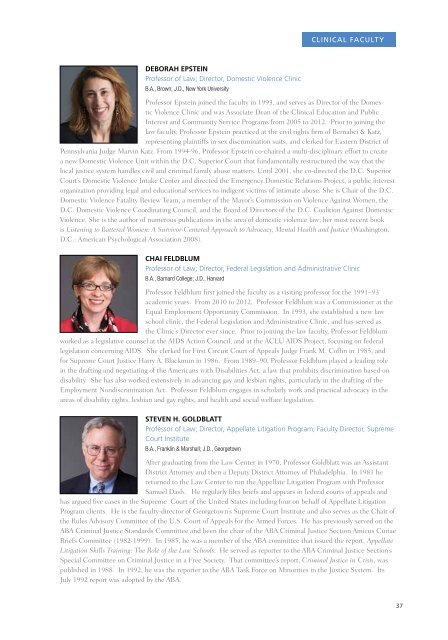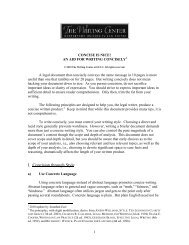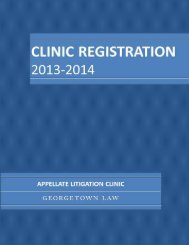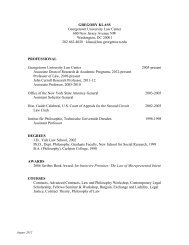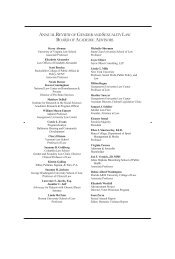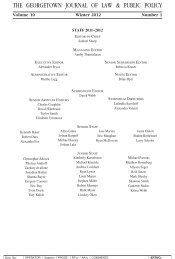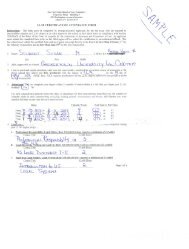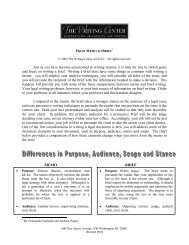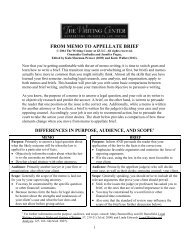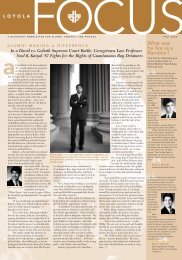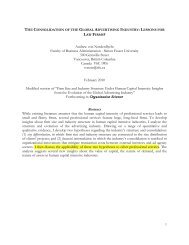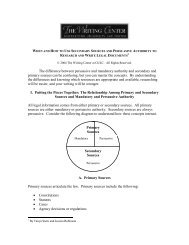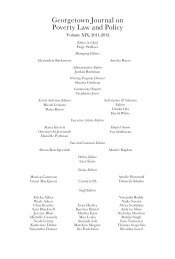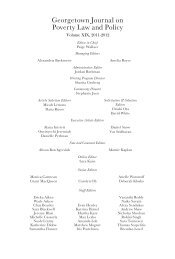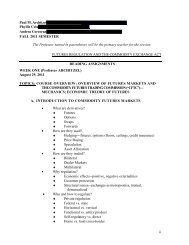experiential learning - Georgetown Law - Georgetown University
experiential learning - Georgetown Law - Georgetown University
experiential learning - Georgetown Law - Georgetown University
Create successful ePaper yourself
Turn your PDF publications into a flip-book with our unique Google optimized e-Paper software.
DEBORAH EPSTEIN<br />
Professor of <strong>Law</strong>; director, domestic violence Clinic<br />
B.A., Brown; J.D., New York <strong>University</strong><br />
CliniCal FaCulty<br />
Professor Epstein joined the faculty in 1993, and serves as Director of the Domestic<br />
Violence Clinic and was Associate Dean of the Clinical Education and Public<br />
Interest and Community Service Programs from 2005 to 2012. Prior to joining the<br />
law faculty, Professor Epstein practiced at the civil rights firm of Bernabei & Katz,<br />
representing plaintiffs in sex discrimination suits, and clerked for Eastern District of<br />
Pennsylvania Judge Marvin Katz. From 1994-96, Professor Epstein co-chaired a multi-disciplinary effort to create<br />
a new Domestic Violence Unit within the D.C. Superior Court that fundamentally restructured the way that the<br />
local justice system handles civil and criminal family abuse matters. Until 2001, she co-directed the D.C. Superior<br />
Court’s Domestic Violence Intake Center and directed the Emergency Domestic Relations Project, a public interest<br />
organization providing legal and educational services to indigent victims of intimate abuse. She is Chair of the D.C.<br />
Domestic Violence Fatality Review Team, a member of the Mayor’s Commission on Violence Against Women, the<br />
D.C. Domestic Violence Coordinating Council, and the Board of Directors of the D.C. Coalition Against Domestic<br />
Violence. She is the author of numerous publications in the area of domestic violence law; her most recent book<br />
is Listening to Battered Women: A Survivor-Centered Approach to Advocacy, Mental Health and Justice (Washington,<br />
D.C.: American Psychological Association 2008).<br />
CHAI FELDBLUM<br />
Professor of <strong>Law</strong>; director, federal Legislation and Administrative Clinic<br />
B.A., Barnard College; J.D., Harvard<br />
Professor Feldblum first joined the faculty as a visiting professor for the 1991–93<br />
academic years. From 2010 to 2012, Professor Feldblum was a Commissioner at the<br />
Equal Employment Opportunity Commission. In 1993, she established a new law<br />
school clinic, the Federal Legislation and Administrative Clinic, and has served as<br />
the Clinic’s Director ever since. Prior to joining the law faculty, Professor Feldblum<br />
worked as a legislative counsel at the AIDS Action Council, and at the ACLU AIDS Project, focusing on federal<br />
legislation concerning AIDS. She clerked for First Circuit Court of Appeals Judge Frank M. Coffin in 1985, and<br />
for Supreme Court Justice Harry A. Blackmun in 1986. From 1989–90, Professor Feldblum played a leading role<br />
in the drafting and negotiating of the Americans with Disabilities Act, a law that prohibits discrimination based on<br />
disability. She has also worked extensively in advancing gay and lesbian rights, particularly in the drafting of the<br />
Employment Nondiscrimination Act. Professor Feldblum engages in scholarly work and practical advocacy in the<br />
areas of disability rights, lesbian and gay rights, and health and social welfare legislation.<br />
STEVEN H. GOLDBLATT<br />
Professor of <strong>Law</strong>; director, Appellate Litigation Program; faculty director, Supreme<br />
Court Institute<br />
B.A., Franklin & Marshall; J.D., <strong>Georgetown</strong><br />
After graduating from the <strong>Law</strong> Center in 1970, Professor Goldblatt was an Assistant<br />
District Attorney and then a Deputy District Attorney of Philadelphia. In 1981 he<br />
returned to the <strong>Law</strong> Center to run the Appellate Litigation Program with Professor<br />
Samuel Dash. He regularly files briefs and appears in federal courts of appeals and<br />
has argued five cases in the Supreme Court of the United States including four on behalf of Appellate Litigation<br />
Program clients. He is the faculty-director of <strong>Georgetown</strong>’s Supreme Court Institute and also serves as the Chair of<br />
the Rules Advisory Committee of the U.S. Court of Appeals for the Armed Forces. He has previously served on the<br />
ABA Criminal Justice Standards Committee and been the chair of the ABA Criminal Justice Section Amicus Curiae<br />
Briefs Committee (1982-1999). In 1985, he was a member of the ABA committee that issued the report, Appellate<br />
Litigation Skills Training: The Role of the <strong>Law</strong> Schools. He served as reporter to the ABA Criminal Justice Section’s<br />
Special Committee on Criminal Justice in a Free Society. That committee’s report, Criminal Justice in Crisis, was<br />
published in 1988. In 1992, he was the reporter to the ABA Task Force on Minorities in the Justice System. Its<br />
July 1992 report was adopted by the ABA.<br />
37


